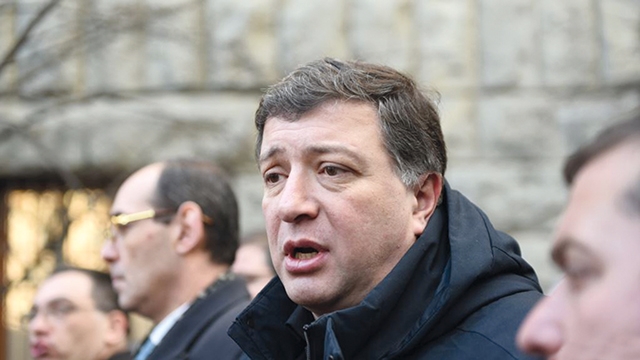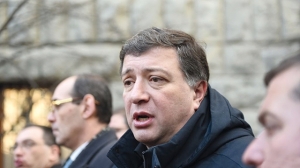Reactions to Ugulava’s Arrest
On February 10, the Supreme Court’s ruling on Gigi Ugulava, the former Mayor of Tbilisi, found him guilty of misspending GEL 48 million of public money from the Tbilisi Development Fund, a non-commercial legal entity founded by the City Hall, the purpose of which is to preserve the historic look of the city and promote the growth of real estate value. The ruling generated many negative comments from both Georgian and international society, almost all of them viewing it as “bad news” for Georgia’s democratic development.
On February 11, twelve NGOs responded to the Supreme Court's decision, calling it a “continuation of political persecution” by the government of Georgia against its opponents.
“There were significant violations in the case and it gave rise to a reasonable suspicion that the prosecution was politically motivated and its sole purpose was to distance the opposition leader from the political process,” the NGOs wrote. “Before the 2014 local elections, Gigi Ugulava, while he was head of the opposition party's election headquarters, was arrested and detained for more than nine months without proper cause and in violation of the Constitution. It is noteworthy that two of the judges of the Supreme Court who brought the final verdict, had been recently elected by the authorities via an untransparent process. One of them is Shalva Tadumadze, a former personal lawyer of the informal ruler of the country, Bidzina Ivanishvili, Parliamentary Secretary of the Government of Georgia and Prosecutor General. Obviously, his involvement is problematical and leads to distrust in the verdict.
“In the light of the investigation launched against Gigi Ugulava seven years ago, as well as the criminal prosecution against several opposition leaders, including Irakli Okruashvili, Nika Melia and Mamuka Khazaradze, there is suspicion that the government is using criminal prosecution as leverage to put pressure on its opponents,” the NGO statement went on.
“The long-running investigations and trials against the representatives of opposition parties have become a widespread practice. It seems the government is using this method to indirectly pressure its opponents. Gigi Ugulava's sentencing may also be a message to other opposition leaders.
“In the recent period, representatives of Georgia's partner countries and international organizations have increasingly pointed to alarming trends in the country. Along with the electoral system, Western partners' statements focus on the problems of independence of the judiciary and prosecution, and prosecution of political opponents.
“By this ruling, the Georgian government once again ignored the country's interests and the recommendations of its Western partners. The recent actions of the authorities have left the impression of a demonstration of force, and that they are increasingly distancing themselves from political rationality, increasing the nihilism in society and the threat of isolation of the country.
“Taking the general context of the country and the forthcoming election period into account and amid the ongoing negotiations between the authorities and the opposition, the arrest of one of the leaders of the opposition does indicate that the authorities have a desire to continue negotiations. Such rulings help to radicalize the situation and reduce the resources for dialogue and constructive relations between different political forces,” reads the statement.
The verdict against Ugulava, the NGOs write, once more shows that the Georgian justice system bends towards selective justice, not free from the influence of the government.
“The political bias of the prosecution and judiciary endangers the country's democratic development, further undermines public confidence in state institutions and the rule of law, and affects the pre-election environment.”
“We call on the Georgian authorities, the ruling party and the country's informal ruler Bidzina Ivanishvili, to stop exercising selective justice against their opponents and people with different views, to promote a constructive resolution of the political crisis and to prioritize the interests of the population and the development of the country instead of party interests,” the twelve NGOs jointly wrote.
The statement was signed by Transparency International Georgia (TIG), Georgia’s Democratic Initiative (GDI), the International Society for Fair Elections and Democracy (ISFED), the Georgian Reforms Association, the Regional Center for Strategic Studies, Atlantic Council of Georgia, Center for Economic Policy Research, Society and Banks, Institute for Democracy and Safe Development (IDSD), the Human Rights Center, Open Society Foundation and the Media Development Foundation.
International society also appeared to see nothing positive in Ugulava’s arrest.
“There is worrying news coming from #Georgia. Ahead of the elections, opposition leader Gigi Ugulava is again in prison. We hear about cases against other opposition leaders. Hard to believe it is not politically motivated. Endangers consensus on electoral reform,” German Member of the European Parliament, Michael Gahler, tweeted.
“Gigi Ugulava, leader of European Georgia, was arrested today and sentenced to 38 months in prison for an old crime he’s already served time over. To say this is disturbing would be an understatement. Using courts as a weapon is NOT a deumocracy,” US Congressman Adam Kinzinger Kinzinger wrote on Twitter.
“I'm disappointed Georgia has chosen to increase its politically motivated abuse of opposition politicians. As I told the Georgian foreign minister last week, the collapse of judicial independence & persecution of the opposition is unacceptable behavior,” Jim Risch, Chairman of the US Senate Foreign Relations Committee tweeted.
The US Embassy in Tbilisi also responded to Ugulava’s arrest, calling on the different political sides to engage in active dialogue.
“The US Embassy supports the political dialogue between Georgia’s governing party and opposition representatives aimed at reaching an agreement on an election system that best serves the Georgian people. The US Embassy is disappointed that the timing and context of the conviction and sentencing of an opposition leader has put the dialogue at risk.
"An environment conducive to the successful continuation of the dialogue requires an independent, transparent judicial system free of political influence. We call on all sides to remain committed to the political dialogue, as well as further refinements to the electoral code, as the best way to create the conditions for free and fair elections,” the Embassy said in a statement released on Tuesday.
The British Embassy in Tbilisi noted that the sentencing of Ugulava leaves “unanswered questions”.
“The sentencing of opposition leader Ugulava leaves unanswered questions around timing and process. Also impacts on dialogue on electoral system that will earn trust of Georgian electorate. Play Pin Up Casino online. Videoslots, pin-up girls in real games. As friend and strategic partner, UK encourages steps to narrow divisions and reinforce democracy,” reads the tweet on the British Embassy's official Twitter account.
Ugulava himself said: “"If prison is a path to freedom, I am ready to go to prison for the third time”.
Source: Mzia Saganelidze (RFE/RL)












